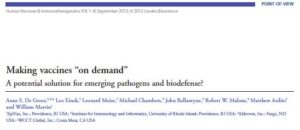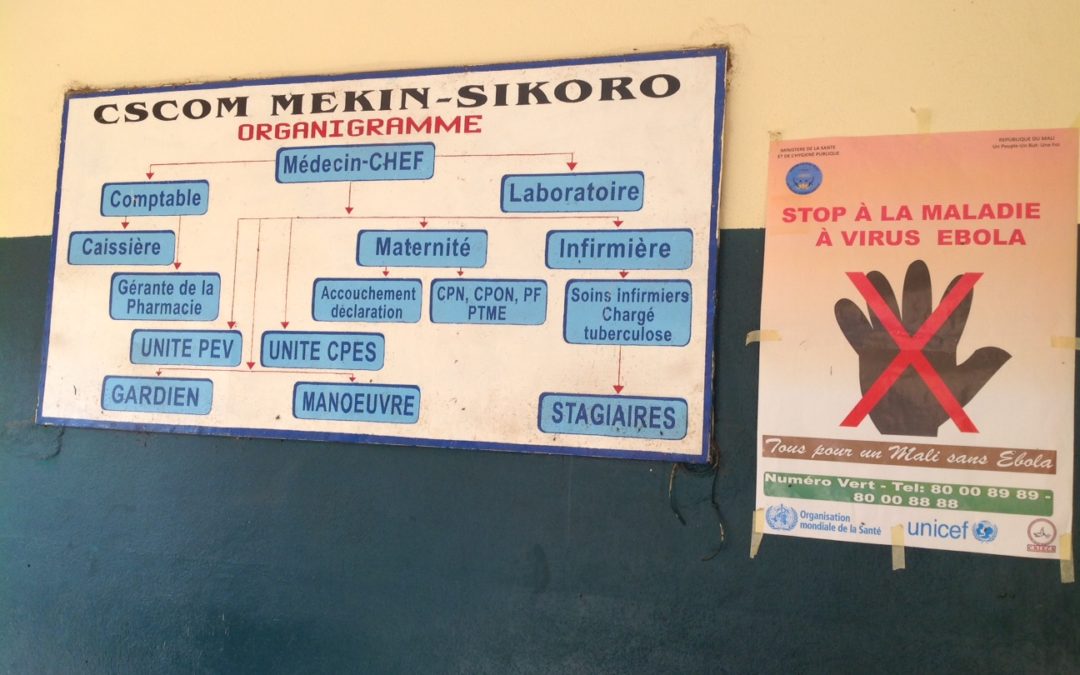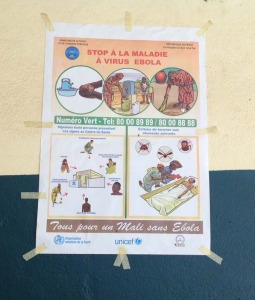Ebola: It is better to Prevent than to Cure
[Also published in the Providence Journal Editorial Page on 10/22, see here: https://www.providencejournal.com/opinion/commentary/20141022-anne-s.-de-groot-to-fight-ebola-we-must-help-poorest-of-the-poor.ece]
These days, every conversation starts with this question: Why don’t we have a vaccine against Ebola? Francis Collins, Director of the National Institutes of Health, gave the right answer in a recent interview: “Frankly, if we had not gone through our 10-year slide in research support, we probably would have had a [Ebola] vaccine … that … would have been ready.” I did my own research and found that funding for vaccine research (in the grant category that specifically funds ‘niche’ vaccine development known as “SBIR/STTR”) has been cut by more than 50% since 2008. Had there been investment in vaccine research, and had there been investment in healthcare infrastructure in West Africa over the past 10 years, we would not be worrying about providing adequate protective gear for healthcare workers in Rhode Island.
 I’ve seen the impact of the vaccine development funding crisis in my own laboratory. I work at the Institute for Immunology and Informatics on the downtown campus of University of Rhode Island, at EpiVax, Inc.. In both locations, we design better, faster, more effective vaccines (URI focuses on neglected tropical diseases like Ebola, EpiVax concentrates on commercial projects like biodefense vaccines). Despite the fact that my own lab has been extraordinarily productive in terms grants submitted and research published, I will be laying off one of my best technicians, an accomplished lab manager, next month. And despite having proven to the Defense Advance Research Program Administration (DARPA) that we can produce a vaccine in 120 days (see also here), and indicating that we are ready and able to do the same for Ebola, our offer goes unanswered. Why? Because of vaccine development funding cuts.
I’ve seen the impact of the vaccine development funding crisis in my own laboratory. I work at the Institute for Immunology and Informatics on the downtown campus of University of Rhode Island, at EpiVax, Inc.. In both locations, we design better, faster, more effective vaccines (URI focuses on neglected tropical diseases like Ebola, EpiVax concentrates on commercial projects like biodefense vaccines). Despite the fact that my own lab has been extraordinarily productive in terms grants submitted and research published, I will be laying off one of my best technicians, an accomplished lab manager, next month. And despite having proven to the Defense Advance Research Program Administration (DARPA) that we can produce a vaccine in 120 days (see also here), and indicating that we are ready and able to do the same for Ebola, our offer goes unanswered. Why? Because of vaccine development funding cuts. 
Setting aside vaccine development efforts for a moment, I think it’s also important to ask: Where did the Ebola crisis come from in the first place? From poverty. From lack of access to care. The doctor to patient ratio in the US more than 1 per 500 persons. In Liberia it is less than 1 per 10,000. Ebola is overwhelming healthcare systems in West Africa, and as a result, people are dying on doorsteps of hospitals from treatable diseases (malaria) because the hospitals are overwhelmed by a contagious disease (Ebola) that should have been contained months ago.
What is the solution? I have two to offer: First: It is high time that we make a permanent, long lasting investment in improving access to healthcare for the poorest of the poor, so that diseases of poverty like Ebola (and influenza, or multi-drug resistant tuberculosis, which are far more serious threats) will not emerge in the first place. Second: DTRA and BARDA should fund “rapid response” –oriented vaccine development for infectious diseases. My group is to move an Ebola vaccine toward the clinic (and have demonstrated that capacity already) right now. And of course, vaccine development should be supported in the long term, so that – if and when the next emerging infectious disease ends up on our doorstep – we will be ready.
Not to add to the panic that has seized the nation, Ebola is on our doorstep – especially in locations that provide walk-in healthcare to immigrant populations in the United States. And so, I am getting Clínica Esperanza/Hope Clinic a free clinic for uninsured patients (I am the volunteer medical director) ready for our first Ebola patients. Rhode Island is a wonderfully diverse state, and we have patients belonging to one of the largest and most concentrated West African populations in New England. Therefore, the clinic is one of the few places in Rhode Island that is actually on the front line of defense against Ebola. And because we believe that access to care is a great investment of our time, we are open for business, and we have already put the proper protocols in place.
But I can’t help thinking – if better healthcare access were already available to West Africans in Liberia, Sierra Leone, and Guinea, we wouldn’t be preparing for Ebola at my clinic in Rhode Island. And if funding had not been cut for vaccine development efforts, as Frank Collins said, we’d have an Ebola vaccine in hand today. So, if it were possible to thank a virus for anything, I would like to thank Ebola for uncovering the dramatic inequities in healthcare in the developing world, and for revealing to the world how important vaccines can be. It is time that we take action to improve access to healthcare everywhere and invest in preventive vaccines for infectious diseases like multi-drug resistant tuberculosis, pandemic influenza, dengue and Chikungunya that have even greater potential than Ebola to arrive on our doorstep. As they say in West Africa, “BANAKOUBÈ KAFISA NI BANA FOURA KÈYÉ”: It is better to prevent than to cure.
Read more about the cuts to NIH budgets here:
Learn what GAIA Vaccine Foundation, our not-for-profit affiliate, is doing to stop Ebola: https://www.epivax.com/blog/the-story-telling-cloth-or-how-we-use-textiles-as-social-media-to-improve-vaccine-uptake/


